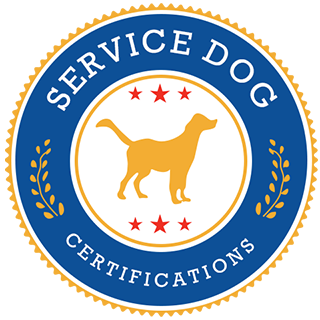Legitimate Service Dog Certification

Fight Service Dog Fraud – Defend Your Rights as a Service Dog Handler
Dogs are a man’s or woman’s best friend. We have trained them for generations to help us hunt, farm, and raise livestock. Now that most of us do not have farms or hunt for food, our dogs are here to support us in different ways.
You can have a legitimate certified Service Dog even if you are not blind or wheelchair-bound. If you suffer from a disability, you are legally qualified to have a service dog. Below are the steps to legitimately certify your service dog.
Step #1 – Train Your Dog, No Shaming Allowed
Admitting to yourself that you could benefit from having a service dog can be the hardest step. Facing your own disability and admitting you need support can make you feel weak. This is not true. Standing up for yourself and seeking self-care is an essential part of growing and healing.
Training your dog to perform tasks for your disability is the first step. To learn more about how to make your dog a service dog, read this post.
Once you have trained your service dog, remember to travel with your certified Service Dog with confidence and be proud of your accomplishment. Training your dog to provide a service for you will create a stronger bond between you and your furry companion.
Step #2 – Legal Education, Understanding Service Dog Laws
Service Dog rights are clearly defined by the ADA. However, there are still a few facts that people commonly get wrong.
Fact or Fiction? #1 – Service Dogs require a doctor’s note.
FICTION… – Service Dogs do NOT require a doctor’s note.
Fact or fiction? #2 – Service Dogs cannot be Pitbulls or large dogs such as Dobermans or Great Danes. Only Golden Retrievers can be service dogs.
FICTION… – There are no breed, weight, or age requirements for Service Dogs. As long as the dog is well trained and can perform a task that aids in their handler’s disability, they can be considered a service dog.
Fact or Fiction? #3 – Landlords cannot charge a pet deposit for a service dog or deny them housing access.
FACT! – Service dogs have public access rights to all public places including housing. A Service Dog is NOT a pet and is categorized as a medical tool.
Step #3 – Practice, Practice, Practice
One of the most nervous parts of having a Service Dog is traveling with them in public. Training your Service Dog at home can be much easier since you are in a comfortable environment and your Service Dog has fewer distractions. Below are tips on how to practice training with your service dog.
Tip #1 – Train your service dog at home
Making sure you and your service dog are speaking the same language is key. Remember, your dog does not actually understand English. They associate the sound you are making with the task that they understand you would like them to perform. Making sure you and your service dog are communicating clearly is the first step to having a strong relationship.
Tip#2 – Train your service dog at a park
After you and your service dog are speaking the same language, it is important to start practicing and training in public places that allow for dogs, such as a park. Parks are excellent places to train your service dog since this space allows for dogs, there are plenty of distractions for your dog to overcome, and it is a beautiful way to spend an afternoon!
Tip #3 – Train your service dog at public places that are service dog-friendly
Although every place in the US is required to grant access to service dogs, some places will refuse to follow the law. Once you are confident in traveling with your service dog, we recommend standing up for your rights. We will discuss this in more depth later in this post. However, when you are first training your service dog, we recommend only exposing yourself to kind and safe environments.
A good way to practice traveling with your service dog is to call a restaurant with an open patio. Inform them you are traveling with your service dog and request that they reserve a table in the corner for you. You can have your service dog practice sitting under the table and waiting patiently for you. They will experience various distractions such as food and people wanting to pet them. Make sure you keep control of your service dog so both of you can gain confidence.
Step #4 – Legitimate Service Dog Certification
The ADA only allows employees and others to ask you two questions regarding your service dog.
Question #1 – Is that a service dog? Places can only ask you this question if it is not clear that your dog is a service dog. If your Service Dog is wearing a service dog vest, they should not need to ask you this question.
Question #2 – What task does your service dog provide for you. You can inform them the specific task your Service Dog provides for you and show them your Legitimate Service Dog Certification. They are not allowed to ask you to show them the task or ask specifically about your disability.
Step #5 – Advocacy for Service Dog Rights
Every service dog handler should become a Service Dog Rights Advocate. Too often we have Service Dog handlers accusing others of not being “legitimate” service dog handlers. This is discrimination and self-hate. Please understand that people are fighting disabilities that you may not be aware of. They have challenges in their lives that make having a Service Dog a bright light for them. Shining doubt on other Service Dog handlers is not right and we advocate against such emotional cruelty. Please be kind to others.
About the Author: The writing team at Service Dog Certifications is made up of folks who really know their stuff when it comes to disability laws and assistance animals. Many of our writers and editors have service dogs themselves and share insights from their own experiences. All of us have a passion for disability rights and animals.
Related Articles

Hipster Dogs: Trendy Pups, Beards, and Beanies
From PBRs to beanie caps, and from plastic sunglasses to “pawsome” music, hipster dogs have taken the world by storm — and there’s no turning back. Because, let’s face it, these little guys and gals were rocking the style before it was cool — not that they would care what’s cool, though. For a “pawsitevly” […]

Read More

How Dogs Can Calm Anxiety
A person suffering from anxiety attacks experience many risks, and it’s one of the reasons why it’s prudent to consider having a service dog or emotional support animal as a companion. The animal can keep the environment safer for the individual and below are some of the ways a dogs can calm anxiety: 1) Dogs […]

Read More

Can Cats Be Service Animals?
Having a cat brings the same positive effects as dogs. These pets can be equally beneficial to a person’s health. Experts have proven that cat owners are less likely to have a health emergency, such as a heart attack, with their feline companion around and cats have also been proven to help alleviate sleeping disorders, […]

Read More


I’m getting an 8 week old puppy in spring to be trained to be my service animal. when should I register the puppy.
I would say preferably after the dog is fully trained but if you need to use the puppy while it is training you should get it registered then, the dog should be registered for when you are to be using your service dog but it is not too early to register them
Dog does not need to be registered and we dont recomend when training having then wear patches saying in training read the ada rules they say they dont require registration we have trained a dad dog and a mobility dog working on training a PTSD dog right know we have 3 dog Trainer s and 3 family’s that work with us we dont charge for dog we get them from pound it takes us 1 yr to get them public ready and 1 yr to get them task ready and approved it’s not a easy task to do it right them it takes 2 weeks to train the person how to handle the dog and care for them as they will be with them 24 he 7 days aweek
How can I have my dog registered and also be allowed in housing
Registration is an optional process for service dogs. Landlords cannot insist that you register your service dog in order to get housing rights.
You don’t have to register your puppy.
Start training right away. My daughter is training hers for her epilepsy. Could take 2-4 years for her to be fully trained the way she needs.
I have a 5 year old Chipin that I trained to give me warning of an oncoming seizure. It took a little over 2 years to train her. She now will look right at me and start barking and jumping..I can immediately lay down on the ground or somewhere safe. I usually have about 15 seconds before the onset of the seizure..grand mal clonic seizures. Good luck with your daughter and the training..stay with it!
What is the cost to register for the puppy n where to send the puppy’s pic to b on his card? Also how much is the cost for a service animal vest?
Legally there is no place recognized to register your dog your dog dose not need any papers you might make it easier by getting them a I’d it costs me 54 dollars it makes air travel easier
Its depends on what you buy. It’s free to register.
I can’t get a dog, why I SERVED i suffer from PTSD 100%
Why can you not get a service dog? Myy husband served we got a note from his doctor stating he would benefit from a service dog. We then looked for a group that worked with veterans and signed up for their service dog training. And got a dog.
Harraased after proof of disability and Drs notes..what. can I possibly do so people can’t discourage distract and make me feel hopeless
As a service dog trainer. You should wait till they turn two or before they turn five. Also picking a dog so young can fail. 70 to 60% fail. So don’t be upset if that happens look for another. Recommend bonding with one from a shelter.
While all of this looks nice, no “certification” is needed for Service Dogs. I agree that you can train your own SD, however, ordering these things doesn’t guarantee anyone is going to do their due diligence if they want to make a pet look like a SD.
And yes, I’ve raised pups for Canine Companions for Independence, so I’m aware of the laws as well as the ins outs, negatives and positives. BTW, CCI does not advocate this type of service.
Please do train your dogs if they’ll be out in public, regardless of whether they’re SDs or pets.
Wow. That is dead wrong. A business may not ask for your doctor’s letter under the ADA, but you are required to have one. (Note, landlord actually can ask for the doctor’s letter under the FHA, and airlines can ask under the ACA.) Courts have consistently established that. In fact, you need a new one every year, to show that your disability is ongoing.
Now if you’re going to ask why one is needed, if you’re not required to show it, that’s obvious. You can’t file a discrimination claim without backing up that your dog truly is a service dog. The doctor’s letter is the only judicially accepted proof of that.
Further, without that letter, some states can fine or criminally charge you for having a fake service dog. Florida, for example, makes it a criminal offense to falsely state you have a service dog.
Logan, I recently read that only a judge has the right to determine if a service dog is legitimate. I believe it was under the ADA guidelines, in the event that someone challenges rather your dog is fake or legitimate.
Hi Logan,
Thanks for your advise. I have a question for you. My son is autistic and out dog has been essential to his improvement. I would like to register our dog as a service dog to avoid issues with our landlord. I already have a letter from my son’s neurologist stating the diagnosis but it doesn’t specifically says he would require a service dog. It is a letter saying my son is autistic and has some intelectual disability as well and I use that letter as proof of my son’s condition when it is required.
Would that letter be enough or do I need to request a letter specifically saying my son needs a service dog to help him?
Thank you
By the way, I live in Miami, Florida
Hi Monica! I too live in Florida and have a service dog … I would like to guide you on this! do you mind if I message you on Facebook ?
Hello I am training my dog to stop and detect panic attacks would she be considered a service dog?
Once your dog is fully trained to help with your panic attacks and has also passed a public access test, your dog can be certified as a psychiatric service dog.
I have sleep paralysis and I trained my dog to wake me up when I am having one and most of the time he anticipates if I am going to have one so he wakes me up before it happens.
I also trained him to alert me when having I am having ‘short of breath’ problem due to continuous coughing.
Can I register him as my service dog?
I am 64yrs old female and he is 11yrs old lab mix.
Thank you.
That is an amazing service your dog provides for you! For more information on how to register your Service Dog, you may find this article helpful –
https://www.servicedogcertifications.org/service-dog-registration-process/
7 month old baby has profound hear loss in both ears. We have a smart that already performs certain functions.
– when the door bell rings, she goes to the door and barks.
– when someone is at the door, she will start whimpering front of the door.
– when we ask her where is “WIlliam” our son, she goes to the room and barks.
Is my son too young to have a service dog registered under him?
We will be flying soon and we want to bring the dog as service dog for William.
how much is it to send a dog threw training i have a altistic son and he is also a heart baby and has a heart defect i wanted to get him a service dog to help with all new things to go threw with him to make him go threw it easier with a forever friend to help him on this journey and the the price on the papers and vest also
The information in this is not correct. I am a service dog myself through the VA for cardiac issues she also helps with my pulse traumatic stress disorder and for my traumatic brain injury. Can he is Rhodesian Ridgeback and yellow lab. South a statement that only a yellow lab can be a service dog that is false.
We think you may have misread our article – we state that there is no breed restriction when it comes to service dogs!
My husband Roland Dowdy registration number 068947521 had a service dog Dixie. My husband passes away and i would like to have her transferred into my name if that’s possible or do i need a new registration?
Please reach out to us at info@servicedogcertifications.org and someone will get back to you.
My Dog is a German Shepard mix he 65 lbs and has been through private obedience and 3 classes at pet smart. I have lost my dad dec 2021 my 1st husband 2014 to ALS we where married for 23 years and my 2nd husband just in November 2021. I am seeing a therapist right now but Rico does go with me everywhere and goes in the stores dogs are allowed in. Please let me know if I am wasting my time.
A dog cannot be considered a service dog unless it is trained to perform a work or task relating to a disability. If your dog provides you with comfort for mental health issues, you may want to consider looking into qualifying your dog as an emotional support animal: https://www.servicedogcertifications.org/how-to-get-an-emotional-support-dog-letter/
Have a DOG THAT IS ESA BUT NEED SERVICE DOG CERTIFICATION TO GET ON SOME AIRPLANES
We want to clarify a few things: 1. ESAs are very different from service dogs, service dogs must be trained to perform tasks relating to a disability and 2. You do not need certification to fly with a service dog, you must complete the DOT’s Service Animal Form, please see this link for more information: https://www.servicedogcertifications.org/how-to-use-the-dots-service-animal-air-transportation-form-to-board-flights/
What document of certification is considered legal for service dog ?
Certifications are not required for service dogs, but you can obtain one at your discretion after your service dog has properly qualified. Please see this link for more info: https://www.servicedogcertifications.org/service-dog-id/